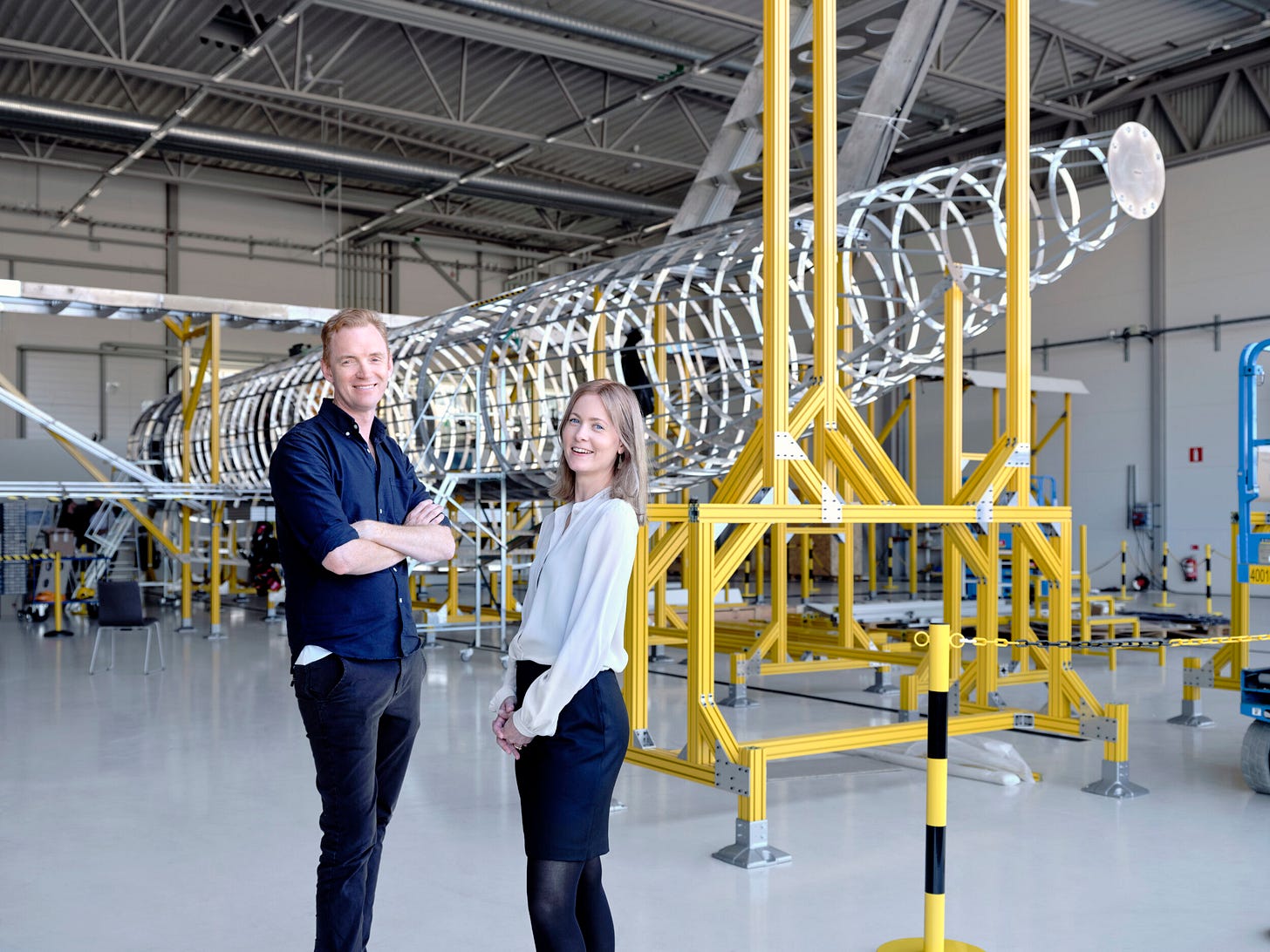#65 Heart Aerospace
Electrifying regional air travel
Read time: 5 minutes
Hi, I’m Javi Gascón.
This is Climate Tech Distillery, a newsletter where I talk about one specific climate tech company every week.
Subscribe for free to receive my weekly articles in your inbox.
Today we’ll distill a company that’s pioneering hybrid-electric aircraft for sustainable regional flights: Heart Aerospace 🇸🇪
Want to sponsor Climate Tech Distillery? Here’s all the info.
What Problem Does Heart Aerospace Tackle❓
Heart Aerospace, like other companies in the aviation sector, tackles the problem of reducing greenhouse gas emissions and environmental impact from air travel. Here are the key parts of the problem:
1. Emissions Contribution: Aviation accounts for approximately 2.5% of global CO₂ emissions, which is around 882 million tonnes of CO₂ annually.
2. Growth in Emissions: Despite improvements in efficiency, aviation emissions have 4x since the 1960s and are expected to triple by 2050 compared to 2015 levels.
3. Carbon Intensity: Flying is highly energy-intensive; for example, a round trip from Lisbon to New York generates emissions equivalent to an average EU citizen's annual heating needs.
4. Non-CO₂ Effects: Aviation also releases other gases like NOx, SO₂, and particulate matter, which contribute significantly to the greenhouse effect.
5. Decarbonization Challenges: The sector is one of the most challenging to decarbonize. The energy density of batteries is 40X lower than that of fuel. For long-haul flights, the batteries would be too heavy. So for long-haul the only option is Sustainable Aviation Fuel (SAF).
Product / Service 📦
Knowing the problems of aviation and that electric planes have their limitations, Heart Aerospace has created the ES-30, a 30-seat hybrid-electric aircraft designed for short to medium-haul flights!
Here’s why it’s amazing:
Flexibility: The ES-30 can operate in fully electric mode for up to 200 kilometers and extend its range to 800 kilometers in hybrid mode with reduced passenger capacity, offering versatility for different routes.
Sustainability: 0 CO2 emissions and 0 noise pollution on flights up to 200 km (124 miles). 50% lower emissions on 200-600 km flights compared to current planes. The SAF used in the reserve motor can reduce CO2 emissions by up to 80% compared to conventional jet fuel.
Cost Efficiency: Substantially lower total operating cost due to reduced fuel consumption, improving even more as tech evolves. Makes regional air travel more affordable for airlines and potentially passengers.
Connectivity: Short runway length and low noise enable new route opportunities from smaller airports. Oh and it charges in just 30 minutes!
Market 🌐
The electric aircraft market, which is experiencing rapid growth driven by environmental concerns, rising fuel costs, advancements in energy storage, and regulatory support.
The global electric aircraft market was valued at $11.5 billion in 2024 and is expected to reach $74.25 billion by 2034.
Other Key Players
ZeroAvia 🇺🇸: Specializes in hydrogen-electric propulsion systems for zero-emission flight technology, focusing on hybrid-electric aircraft for various aviation needs.
Ampaire 🇺🇸: Focuses on the electrification of air travel with hybrid-electric aircraft systems, targeting regional air mobility.
VoltAero 🇫🇷: Electrification of air travel with hybrid-electric aircrafts, designed to reduce emissions, noise, and operational costs, targeting regional air mobility.
Awesome to see several companies figuring this out!
Founding Story 🦄
Heart Aerospace was founded in 2018 by Anders Forslund and his wife, Klara Forslund, in Gothenburg, Sweden. Anders Forslund, who holds a PhD in aerospace product development, was inspired by his research exchange at MIT and the Norwegian government's goal to make all short-haul flights electric by 2040. This vision aligned with Sweden's history in aerospace and electric mobility, prompting him to initiate the project.
The company participated in the Y Combinator startup accelerator in 2019 and since then they have achieved amazing milestones…
$145 million raised from Bill Gates' Breakthrough Energy Ventures, United Airlines, EQT, Norrsken and others.
250 firm orders for the ES-30 and letters of intent for hundreds more!
Established a research and development hub in Los Angeles, USA.
Over 130 employees.
Top Impact Stats 📈
1. The ES-30 will start flying in 2025 and other aircraft models are being developed in parallel.
2. By late 2030’s Heart Aerospace planes will travel over 400 kms fully electric and over 1000 in hybrid mode.
3. 22% is the expected reduction of total industry emissions from electrification of regional aviation by 2050.
Whenever you’re ready, there are 2 ways I can help you:
Scale and optimize your climate business: I build low-code automation systems for climate companies so they can free up time to scale their revenues and their climate impact.
Give visibility to your climate company: Get your company in front of an audience of thousands of climate players and enthusiasts by sponsoring newsletter issues and LinkedIn posts.
Thanks for reading today’s issue! If you liked it feel free to hit the ❤️ button and share it with someone who might like it too. See you next Saturday :)










I wonder if they've done testing in northern climates 🤔 many things that work in Scandinavia also have a high chance of working in Canada. This could be very interesting for more local travel.